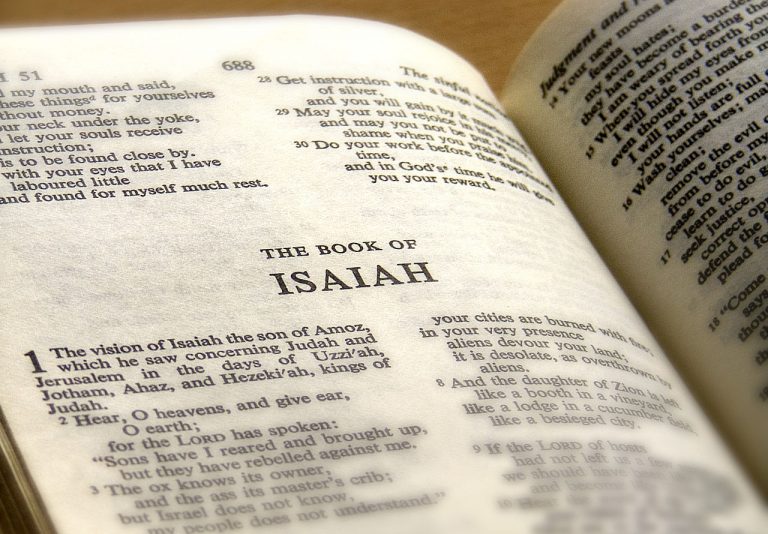Isaiah’s Vision of the Lord
6 In the year that King Uzziah died I saw the Lord sitting upon a throne, high and lifted up; and the train of his robe filled the temple. Above him stood the seraphim. Each had six wings: with two he covered his face, and with two he covered his feet, and with two he flew. And one called to another and said:
“Holy, holy, holy is the LORD of hosts;
the whole earth is full of his glory!”
And the foundations of the thresholds shook at the voice of him who called, and the house was filled with smoke. And I said: “Woe is me! For I am lost; for I am a man of unclean lips, and I dwell in the midst of a people of unclean lips; for my eyes have seen the King, the LORD of hosts!”
Then one of the seraphim flew to me, having in his hand a burning coal that he had taken with tongs from the altar. And he touched my mouth and said: “Behold, this has touched your lips; your guilt is taken away, and your sin atoned for.”
Isaiah’s Commission from the Lord
And I heard the voice of the Lord saying, “Whom shall I send, and who will go for us?” Then I said, “Here I am! Send me.” And he said, “Go, and say to this people:
“‘Keep on hearing, but do not understand;
keep on seeing, but do not perceive.’
Make the heart of this people dull,
and their ears heavy,
and blind their eyes;
lest they see with their eyes,
and hear with their ears,
and understand with their hearts,
and turn and be healed.”
Then I said, “How long, O Lord?”
And he said:
“Until cities lie waste
without inhabitant,
and houses without people,
and the land is a desolate waste,
and the LORD removes people far away,
and the forsaken places are many in the midst of the land.
And though a tenth remain in it,
it will be burned again,
like a terebinth or an oak,
whose stump remains
when it is felled.”
The holy seed is its stump.
(ESV)
Isaiah 6 Commentary
by Brad Boyles
The first 5 chapters of Isaiah outline his prophecies, but do not establish his calling. In chapter 6 we read the details of God’s calling for Isaiah.
In many ways, Isaiah filled a role least desired among men. He was a messenger during a time when the message was not positive. God’s judgment was building with Judah and it was Isaiah’s duty to confront them with truth. Confrontation is never easy. In fact, it’s awful! However, Isaiah’s heart broke for the people. He grieved in the same way the Lord did. He didn’t relay the message in a condescending way, but rather, from a position of love. Repentance and restoration dogged Isaiah’s mind.
Isaiah’s name means, “the Lord saves.” This was another role for him. He would bring a message of hope to a nation that longed for a Messiah. Even his son’s names (Isaiah 7 &8), would point to King Jesus. So, alongside the judgment and truth is the message of hope and Salvation. It is the message of grace and truth.
Some theologians call the book of Isaiah “remnant theology.” Essentially, the judgment of the wicked and the salvation of the faithful remnant. It’s ironic to consider that the same man (Isaiah) who condemned Judah also foreknew their great victory through Christ. What I appreciate most about Isaiah is the continual reliance he places upon the Lord in all circumstances. He counted human wisdom as rubbish compared to God’s sovereignty. In order to fulfill his purpose, he had to!




